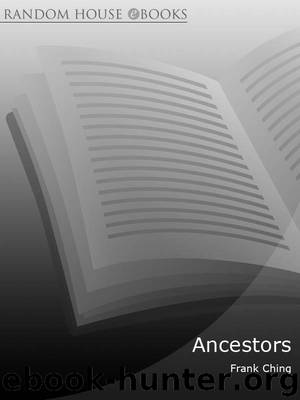Ancestors: The story of China told through the lives of an extraordinary family by Ching Frank

Author:Ching, Frank [Ching, Frank]
Language: eng
Format: mobi
ISBN: 9781407029986
Publisher: Ebury Publishing
Published: 2011-09-29T16:00:00+00:00
CHAPTER NINETEEN
Qin Huitian: Minister of Punishments
HUITIAN BECAME THE most distinguished member of our family in the Qing dynasty, just as Qin Jin had been the most outstanding in the Ming.
In 1752, the year after Qianlong’s return from the south, Huitian was appointed vice-minister of punishments, a job in which it was almost impossible to avoid offending or making enemies of influential people. Those who worked in the Ministry of Punishments were liable to punishment themselves if the emperor should disagree with their judgments. The Chinese concept of justice included a precisely appropriate punishment for each offense. And if an official punished an innocent person, he was liable for punishment himself. Moreover, even if a person was found guilty, an official could be penalized if the punishment was deemed incommensurate with the crime, either too lenient or too severe. Moreover, often an official had to deal with cases in which different Confucian principles were in direct conflict.
Each ministry in the Qing dynasty had two heads, one Manchu and one Chinese, with the Manchu automatically outranking the Chinese. There were four vice-ministers, equally divided between the two ethnic groups.
As vice-minister of punishments, Huitian was responsible for dealing with some of the most difficult cases in the empire. One case he handled involved a man who caught his wife in the act of adultery. Enraged, he picked up a chopper and attacked the couple, killing his wife and wounding the other man. He was arrested not for killing his wife but for wounding the other man, who happened to be his uncle. According to Confucian principles, to raise one’s hand against one’s elders was a most grievous offense. Even though the uncle was ordered to be executed for adultery, the husband was also condemned to death for having struck his uncle.
Huitian expressed his views on this legal and moral dilemma to the emperor in this fashion:
“According to the law, when a husband catches his wife and her lover in bed and kills them, the husband is not guilty of murder. So, if the husband injures a senior relative in an incident of adultery, no sentence should be suggested. According to the law, any relatives of a couple can be allowed to seize an adulterer, but if a man kills someone who is his elder, he will face a charge of murder. However the law only mentions ‘killing,’ not ‘injuring.’ So the husband who, in the course of seizing an adulterer, injures his elder, should not be found guilty.
“When an elder commits adultery with a junior member of the family, according to law he should be sentenced to capital punishment. The law allows the husband to seize the adulterer and it is difficult to prevent injury in such cases. We have thoroughly researched the issue and could find no precedent for executing a husband who injured a senior relative who was committing adultery.”1 Qianlong apparently found the argument persuasive. The husband was pardoned.
But Huitian was not always successful in obtaining the emperor’s approval. The
Download
This site does not store any files on its server. We only index and link to content provided by other sites. Please contact the content providers to delete copyright contents if any and email us, we'll remove relevant links or contents immediately.
| African-American Studies | Asian American Studies |
| Disabled | Ethnic Studies |
| Hispanic American Studies | LGBT |
| Minority Studies | Native American Studies |
Cecilia; Or, Memoirs of an Heiress — Volume 1 by Fanny Burney(32527)
Cecilia; Or, Memoirs of an Heiress — Volume 2 by Fanny Burney(31928)
Cecilia; Or, Memoirs of an Heiress — Volume 3 by Fanny Burney(31915)
The Great Music City by Andrea Baker(31898)
We're Going to Need More Wine by Gabrielle Union(19020)
All the Missing Girls by Megan Miranda(15888)
Pimp by Iceberg Slim(14464)
Bombshells: Glamour Girls of a Lifetime by Sullivan Steve(14037)
For the Love of Europe by Rick Steves(13814)
Talking to Strangers by Malcolm Gladwell(13330)
Norse Mythology by Gaiman Neil(13314)
Fifty Shades Freed by E L James(13215)
Mindhunter: Inside the FBI's Elite Serial Crime Unit by John E. Douglas & Mark Olshaker(9289)
Crazy Rich Asians by Kevin Kwan(9261)
The Lost Art of Listening by Michael P. Nichols(7475)
Enlightenment Now: The Case for Reason, Science, Humanism, and Progress by Steven Pinker(7287)
The Four Agreements by Don Miguel Ruiz(6728)
Bad Blood by John Carreyrou(6599)
Weapons of Math Destruction by Cathy O'Neil(6248)
